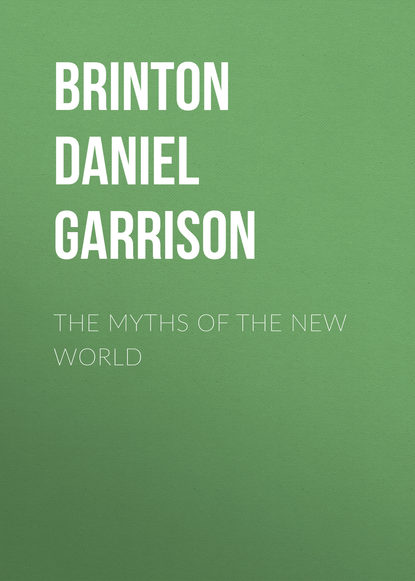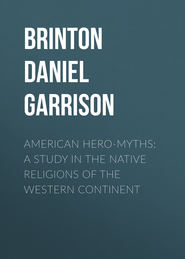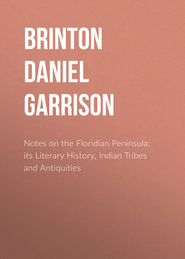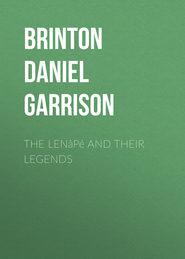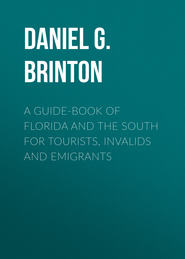По всем вопросам обращайтесь на: info@litportal.ru
(©) 2003-2024.
✖
The Myths of the New World
Настройки чтения
Размер шрифта
Высота строк
Поля
Torquemada, Monarquia Indiana, lib. vi. cap. 27.
376
Sahagun, Hist. de la Nueva España, lib. x. cap. 29.
377
Rel. de la Nouv. France, 1636, p. 105.
378
Molina, Hist. of Chili, ii. p. 81, and others in Waitz, Anthropologie, iii. p. 197.
379
Nachrichten von Grönland aus dem Tagebuche vom Bischof Paul Egede, p. 104: Kopenhagen, 1790.
380
Rel. de la Nouv. France, 1636, p. 105.
381
Long’s Expedition, i. p. 280; Waitz, Anthropologie, iii. p. 531.
382
Müller, Amer. Urreligionen, p. 287.
383
Compare Garcilasso de la Vega, Hist. des Incas., liv. ii. chap. ii., with Lett. sur les Superstitions du Pérou, p. 104. Çupay is undoubtedly a personal form from Çupan, a shadow. (See Holguin, Vocab. de la Lengua Quichua, p. 80: Cuzco, 1608.)
384
“El que desparece ô desvanece,” Hist. de Yucathan, lib. iv. cap. 7.
385
Ximenes, Vocab. Quiché, p. 224. The attempt of the Abbé Brasseur to make of Xibalba an ancient kingdom of renown with Palenque as its capital, is so utterly unsupported and wildly hypothetical, as to justify the humorous flings which have so often been cast at antiquaries.
386
Scheol is from a Hebrew word, signifying to dig, to hide in the earth. Hades signifies the unseen world. Hell Jacob Grimm derives from hilan, to conceal in the earth, and it is cognate with hole and hollow.
387
Pennock, Religion of the Northmen, p. 148.
388
La Hontan, Voy. dans l’Am. Sept., i. p. 232; Narrative of Oceola Nikkanoche, p. 75.
389
Morse, Rep. on the Ind. Tribes, App. p. 345.
390
Garcia, Or. de los Indios, lib. iv. cap. 26, p. 310.
391
Voiages aux Indes Oc., ii. p. 132.
392
Lettres Edif. et Cur., v. p. 203.
393
Alger, Hist. of the Doctrine of a Future Life, p. 72.
394
Loskiel, Ges. der Miss. der evang. Brüder, p. 49.
395
Richardson, Arctic Expedition, p. 260.
396
Gumilla, Hist. del Orinoco, i. pp. 199, 202, 204.
397
Ruis, Conquista Espiritual del Paraguay, p. 48, in Lafitau.
398
Notes on the Floridian Peninsula, pp. 191 sqq.
399
Bruyas, Rad. Verborum Iroquæorum.
400
376
Sahagun, Hist. de la Nueva España, lib. x. cap. 29.
377
Rel. de la Nouv. France, 1636, p. 105.
378
Molina, Hist. of Chili, ii. p. 81, and others in Waitz, Anthropologie, iii. p. 197.
379
Nachrichten von Grönland aus dem Tagebuche vom Bischof Paul Egede, p. 104: Kopenhagen, 1790.
380
Rel. de la Nouv. France, 1636, p. 105.
381
Long’s Expedition, i. p. 280; Waitz, Anthropologie, iii. p. 531.
382
Müller, Amer. Urreligionen, p. 287.
383
Compare Garcilasso de la Vega, Hist. des Incas., liv. ii. chap. ii., with Lett. sur les Superstitions du Pérou, p. 104. Çupay is undoubtedly a personal form from Çupan, a shadow. (See Holguin, Vocab. de la Lengua Quichua, p. 80: Cuzco, 1608.)
384
“El que desparece ô desvanece,” Hist. de Yucathan, lib. iv. cap. 7.
385
Ximenes, Vocab. Quiché, p. 224. The attempt of the Abbé Brasseur to make of Xibalba an ancient kingdom of renown with Palenque as its capital, is so utterly unsupported and wildly hypothetical, as to justify the humorous flings which have so often been cast at antiquaries.
386
Scheol is from a Hebrew word, signifying to dig, to hide in the earth. Hades signifies the unseen world. Hell Jacob Grimm derives from hilan, to conceal in the earth, and it is cognate with hole and hollow.
387
Pennock, Religion of the Northmen, p. 148.
388
La Hontan, Voy. dans l’Am. Sept., i. p. 232; Narrative of Oceola Nikkanoche, p. 75.
389
Morse, Rep. on the Ind. Tribes, App. p. 345.
390
Garcia, Or. de los Indios, lib. iv. cap. 26, p. 310.
391
Voiages aux Indes Oc., ii. p. 132.
392
Lettres Edif. et Cur., v. p. 203.
393
Alger, Hist. of the Doctrine of a Future Life, p. 72.
394
Loskiel, Ges. der Miss. der evang. Brüder, p. 49.
395
Richardson, Arctic Expedition, p. 260.
396
Gumilla, Hist. del Orinoco, i. pp. 199, 202, 204.
397
Ruis, Conquista Espiritual del Paraguay, p. 48, in Lafitau.
398
Notes on the Floridian Peninsula, pp. 191 sqq.
399
Bruyas, Rad. Verborum Iroquæorum.
400





